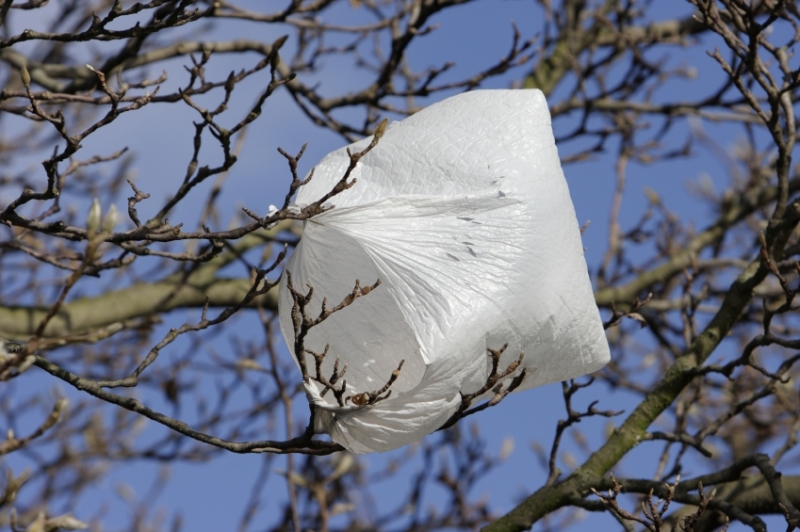California Becomes First State to Ban Disposable Plastic Bags
Other Single-Use Shopping Bags Also Restricted Under New Law
 California has become the first state in the nation to ban major retail stores from providing single-use carryout plastic bags to their customers. The new legislation similarly prohibits stores from selling or distributing recycled paper bags unless the store makes such bags available for purchase for no less than 10 cents per bag.
California has become the first state in the nation to ban major retail stores from providing single-use carryout plastic bags to their customers. The new legislation similarly prohibits stores from selling or distributing recycled paper bags unless the store makes such bags available for purchase for no less than 10 cents per bag.
The new law, SB 270 (Padilla), was signed into law by California Governor Jerry Brown today. (Governor Brown actually announced his intention to approve this legislation earlier this month, during his debate with Republican gubernatorial candidate Neel Kashkari (who opposed the bill).) In a signing statement accompanying the new legislation, Governor Brown declared, “This bill is a step in the right direction–it reduces a torrent of plastic polluting our beaches, parks and even the vast ocean itself. We’re the first to ban these bags, and we won’t be the last.”
The new law’s primary target is the ubiquitous disposable plastic bag, which environmentalists have decried for many years. Plastic bags, which are not readily biodegradable, clog municipal sewage treatment plants, blight California beaches and parks, and represent a major form of coastal and ocean pollution.
The new law begins to take effect on July 1, 2015: on that date, larger grocery stores, pharmacies and other big retail establishments are prohibited from distributing single-use plastic bags; required to begin charging for recycled paper bags; and directed to make reusable shopping bags–which are subject to strict new criteria–available to their customers. The same restrictions will be imposed on convenience stores, liquor stores and other, relatively small retail outlets effective one year later–on July 1, 2016. Other retail establishments that are not expressly made subject to SB 270’s requirements can voluntarily “opt in” to them by notifying state officials of their intent to do so.
SB 270 will be administered by California’s Department of Resources Recycling and Recovery, a unit within the state Environmental Protection Agency. California’s Attorney General and local prosecutors–but not citizen groups–are authorized to enforce the new legislation, and can seek civil fines ranging from $1000-5000 for each violation.
Passage of SB 270 marks a major victory for several California legislators, environmental organizations such as Californians Against Waste, and grass roots community groups, who before 2014 had for many years lobbied unsuccessfully for a statewide ban on single-use plastic bags.
The political path to SB 270’s passage has been a most interesting one. Over the past 15 years or so, some 120 California local governments (representing 10 million of the state’s 38 million residents) have enacted a wide array of single-use bag bans, mandatory fee systems, etc. Until recently, the California Grocers Association (CGA) fought these local ordinances on a case-by-case basis, with varying degrees of success. But faced with a growing cacophony of often-disparate local measures, the CGA a couple of years ago had a political epiphany, concluding that its members would be better served by a single set of state standards than hundreds of different local ordinances. CGA’s political conversion was critical to enactment of SB 270 this year.
Meanwhile, plastic bag manufacturers mounted a ground war of legal challenges to most of the local plastic bag ordinances enacted since 2000. Perversely, in many cases they sued under the California Environmental Quality Act, arguing that local communities needed to prepare expensive and time-consuming environmental impact reports before they could adopt bans on retailers’ distribution of single-use plastic bags. (The California Supreme Court quite appropriately rejected the industry’s counterintuitive theory in a 2011 decision, Save the Plastic Bag Coalition v. City of Manhattan Beach.)
Significantly, SB 270 contains a “soft” preemption provision that supersedes local ordinances adopted on or after September 1, 2014 that relate to “regulation of reusable grocery bags, single-use carryout bags, and recycled paper bags…” However, the legislation leaves intact such local ordinances enacted before that date. That can’t be good news for the CGA, and I similarly believe the public interest would have been better served by a hard preemption clause displacing all such local ordinances in favor of a single set of statewide standards. But politics, as we know, is the art of the possible; my hunch is that such a sweeping preemption provision would have engendered potentially fatal opposition to SB 270 by California cities and counties.
All in all, however, SB 270 represents a welcome and overdue legislative response to one of modern society’s most pernicious waste-related problems. The new legislation once again places California among the nation’s and global leaders when it comes to environmental sustainability. It will be most interesting to see if Governor Brown is correct in predicting that SB 270 will be a catalyst for similar laws in other states. I’m betting that it will.






Reader Comments